You might not want to bother taking your pan down to the river.
You’d probably be smarter to do something more practical. The practical folks are the ones who get rich.
Cook for hungry miners, say. Even if it means cooking beans over fire for eight hours in 95 degree heat.
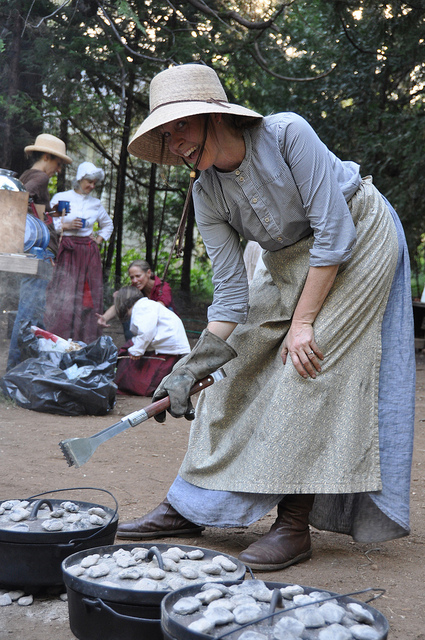
Even better, you could bake pies. Miners pay dearly for a slice of pie. One Gold Rush woman apparently made $18,000 on pie alone.
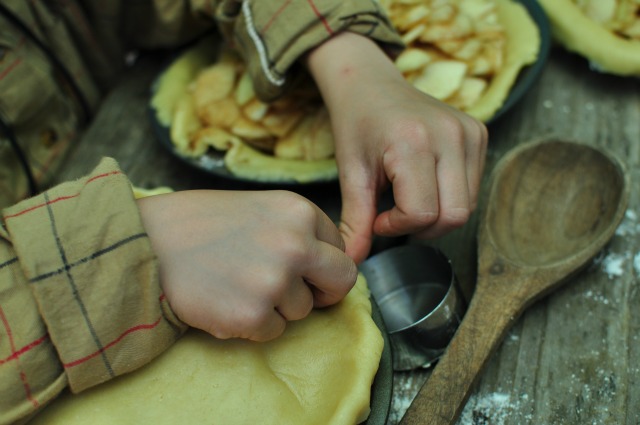
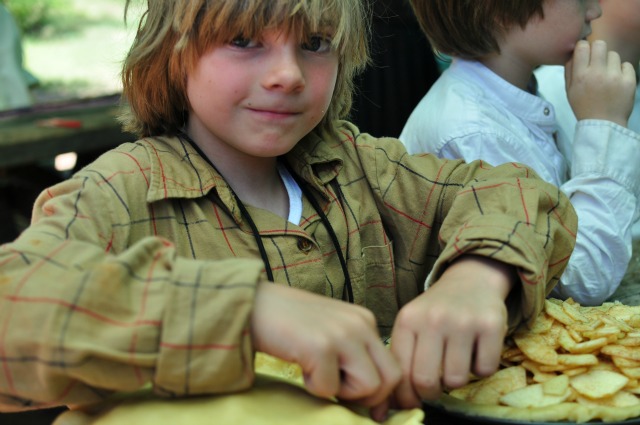
You could practice a trade. Blacksmithing would be a good choice. Gold Rush smiths provide specialized tools that the miners need, and can distribute them faster than the markets back East. Often at steep prices.
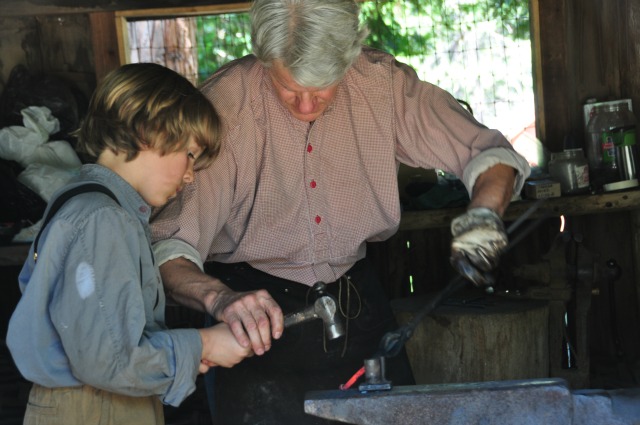
You could open a saloon. In addition to the hard stuff, you could offer a tasty house-made sassafras soda.
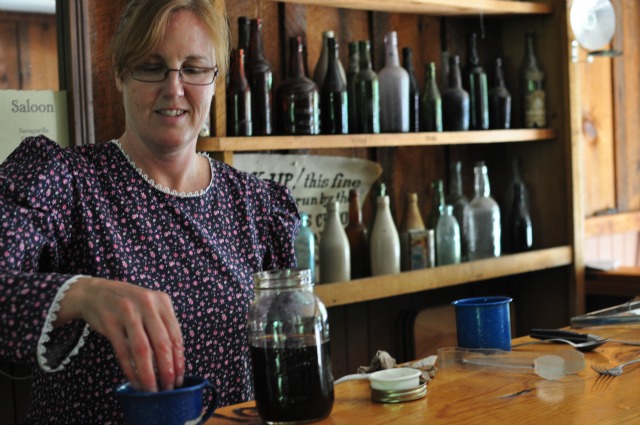
Or you could entertain people. Folks are willing to toss a bit of gold dust into the musician’s hat to hear a fine version of “Oh Susanna”–and accumulated dust can add up to more than you might think.
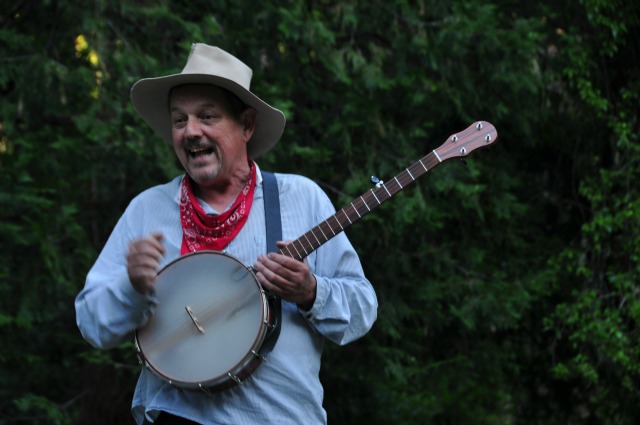
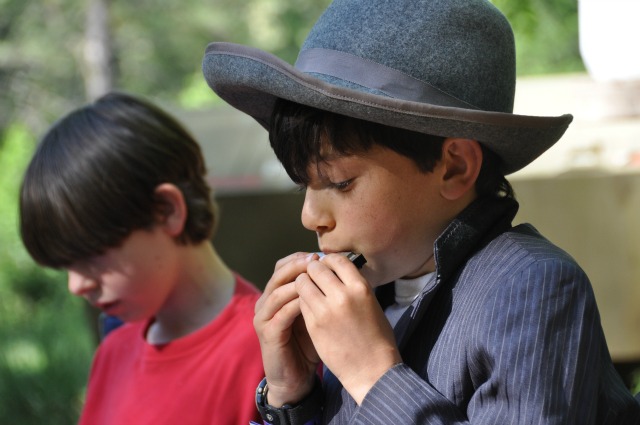
How about photography? Miners are eager to have photos to send home. (Although the unsmiling expressions might hint to the family back home that the gold isn’t just sitting at the bottom of the river, ripe for plucking.) **
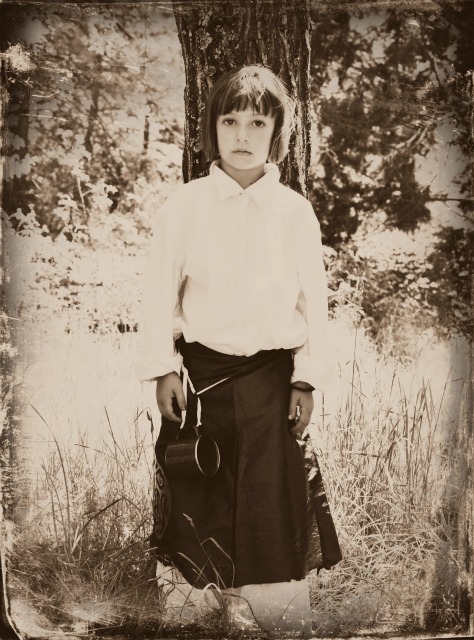
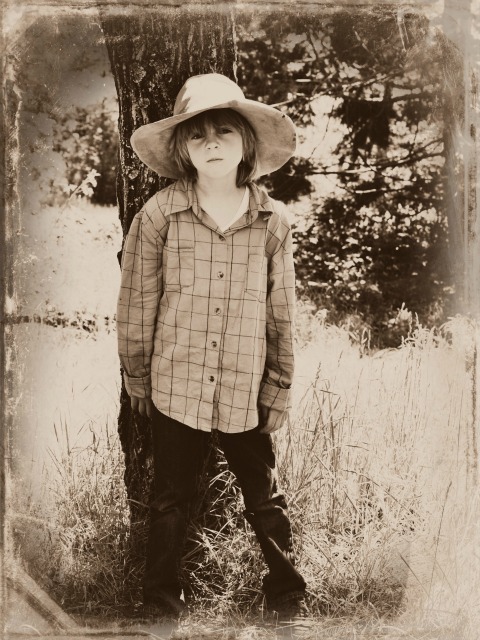
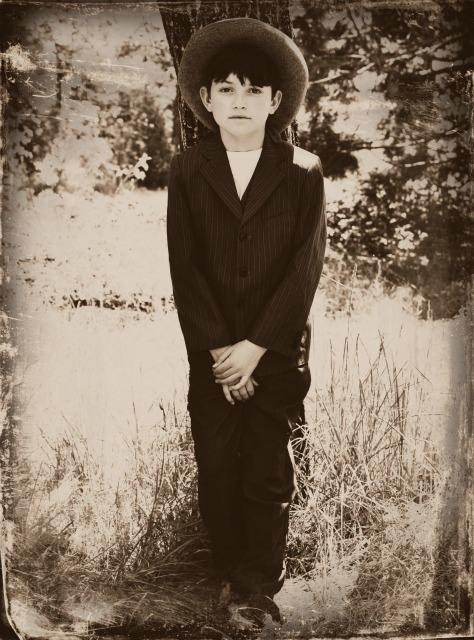
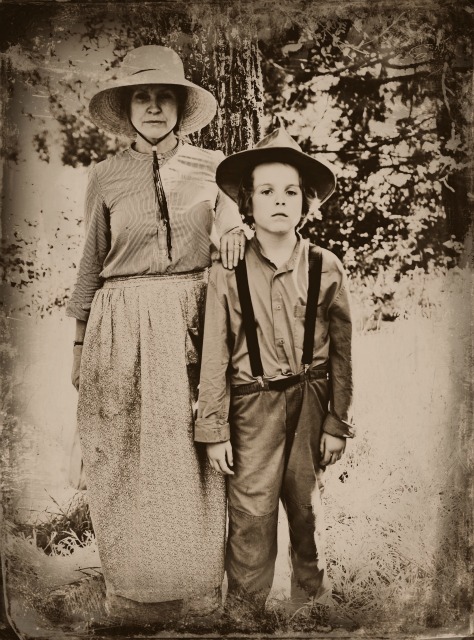
Because the truth is, panning doesn’t pay. For most it’s slow, tedious, fruitless work.
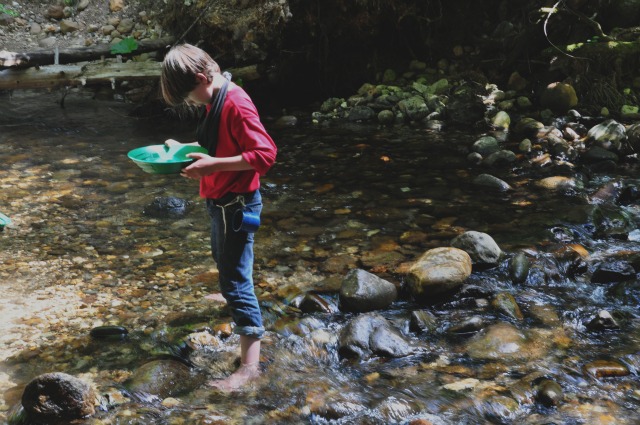
But maybe, in the end, that doesn’t matter. Maybe what matters is that you made the journey west and had your adventure. And you can tell everyone that the experience was worth its weight in gold.
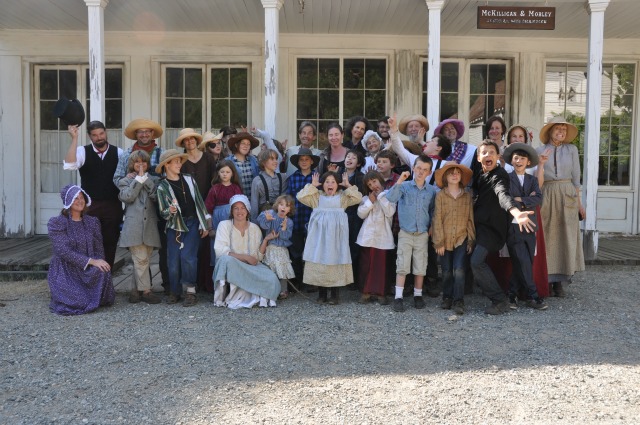
* I could have titled this post How to Help Your Kid Love History. In which case the directives would have been quite different. I would have told you to go on as many living history trips as you can. Even if it means you have to research the good ones and organize them. Even if that means sending endless emails, and organizing meetings, and scrounging up costumes, and devising somewhat historically authentic menus that modern kids might actually eat, and buying a carload of groceries including 48 pounds of apples for sauce and pie, and cooking over open fire in California foothills heat. Even if it means sleeping over a rattlesnake. (But that’s another story.) Yes, it will be a lot of work. But it will be worth it. You’ll make your journey and have your adventure. And your kids might become history lovers.
** Did you realize that there was a boon of female photographers after the Gold Rush? If you’re a post-Gold Rush photographer yourself, you might enjoy learning how to turn your photos into faux daguerreotypes. Just click on over to the fabulous picmonkey.com and mess around with their daguerreotype filters and frames. Worth its weight in gold. (How much does a website weigh, anyhow?)

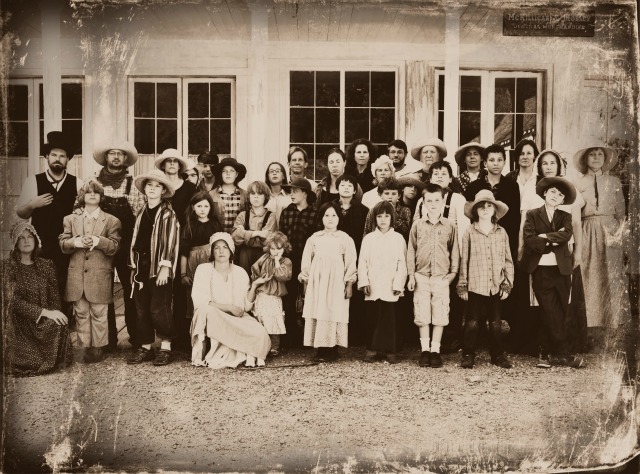
Just loved the post! I am so happy to see homeschoolers learning this way and to know the great tradition of authentic education lives on in our community. Who knows maybe I will homeschool a grandchild some day?
I think I will be in this support group forever, Jenny! Sometimes it’s a little nutso to be doing stuff like this with one kid, though, and negotiating NYC apartment leases with another! Just look at where homeschooling will take you! Our boys are on an entirely different sort of adventure…
Thanks for saying hello here, my friend!
The hub and I remarked last week how little we remember of our state’s history. (The one kid in class who got into it loved Michigan history & the Michigan outdoors before that class–he’s a DNR employee now, no surprise).
Now if we had taken trips to illustrate the lessons, that would stick. Either that, or the adventures in getting there and getting along would be their own education.
Yep, it’s hard to forget your California history when you’ve slept where miners slept, tried panning for gold and eaten hardtack, pine nuts and boiled quail’s eggs for lunch! I never remembered much California history myself until I got a do-over with my kids…
Thanks for your comment, Jennifer!
this looks so amazing!
It was utterly fabulous. A homeschooling highlight.
This does look really fun. I love that you’ve been able to do these extended immersion experiences as a family–have you initiated this yourself with a historical site? How did you make it happen? I have seen day camp-type things that kids do without parents around here, but haven’t seen whole-family historical experiences like your Russian immigrant re-enactment or this delicious-looking Gold Rush re-enactment. My daughter would eat this up with a spoon! She’s doing a three-day class at a local historic site with a friend of hers–one day they pretend they’re MN pioneer girls, the second they’re Dakota girls, and the third they’re Victorians. It would be lovely, though, to sink down into one period for a few days, which looks like what you did here. Oh, what fun! I’m glad you enjoyed yourselves and clearly learned so much.
Hi Carrie,
Here in California, there are many living history opportunities, often through the state parks, which makes them pretty affordable. Generally they are geared toward school groups. In California, public school kids focus on California history in the fourth grade, so many of these trips are designed for fourth grade classrooms. For example (if you’re in California) this trip was at Malakoff Diggins State Park, and the other one we did was at Fort Ross State Park. There are other living history trips at Sutter’s Fort, Angel Island, Columbia State Park, Indian Grinding Rock State Historic Park. I’m sure there are many more. Sometimes they are called living history programs, or environmental living history. Many are overnights, which makes the experience that much deeper. This Gold Rush trip was two nights long!
Although they are designed for school groups, they will usually take homeschooling groups as well. If they haven’t done that before, you may have to educate them a bit! You need to help them understand that there will be an age range (not just kids from one “grade”) and that there will likely be a higher parent-kid ratio. Most programs that my friends and I have worked with have been open to this, and are generally quite pleased with the enthusiasm of homeschoolers.
It can be a fair amount of work to organize something like this. In California, you have to sign up for the trips up to a year ahead, and sometimes there’s a lottery. There’s usually a teacher training which at least one parent has to attend. These programs are really designed for school teachers who bring a new class year after year, and get really good at knowing how to run the programs. There can be a big learning curve for homeschooling families who need to master it all for a one-time trip. I organized this Gold Rush trip to Malakoff, and it was a pretty time-intensive undertaking. I was lucky enough to have a homeschooling friend who had done the trip a few years back, though, and she was a huge help.
What’s nice about these programs is that they are set up with lots of activities, cooking and costume recommendations, itineraries, etc. Often they are run mostly by the teachers or parents, but the program is set up so you aren’t having to plan it all.
Homeschoolers should absolutely check into what history programs are available for school groups, and pursue setting them up for themselves. You can share your experiences with one another, so if another parent wants to organize a trip a few years down the road, you can help.
Yes, it can be a ton of work to set something like this up, but I think it is absolutely worth it. These trips really have been some of our most memorable homeschooling experiences. Every time I look at the photos from this trip, I get goose bumps, I loved it so much.
You are a star, Patricia. Look at this from a blog-reader’s perspective- look at the time and effort you put into the post, and then the replies, helping us figure out how to do it for ourselves, umm, that is, I mean our kids! That is love.
Now I’m off to find out what’s on in England!
It is love. You’re right. I can’t help myself. It feels so good to help people–especially when they want that help.
And you found that Tudor re-enactment so you did find what’s on!
Oh my gosh, I LOVED this post (as always). I agree that kids learn by experiences and really getting into the time period. There are so many opportunities if you look carefully and are willing to out yourself out there. My family loves history and we live in MA and have learned so much about the Revolutionary War as well as the Civil War by getting into the nitty gritty of it. Books, reenactments, visits to living history museums all help, as does getting the right clothing and doing things they did back then.
My 16 year old has worked at a living history museum for the past year and he has learned trades from the 1830’s, including blacksmithing, farm work, and tin smithing (though it was not called that back then). He sometimes teaches visitors games from that time ear and works as a “teacher” in the one room school house. He always has a story to share at the dinner table about new information he has learned from those who have worked at the village for a longer period of time. His love of history may have come from how we learned history as a family – by doing, reading, exploring, and driving all along the eastern shoreline visiting interesting sites. Being on the kids’ time and not forcing the kids or ourselves to eek everything out of a place TRULY is important. I know too many adults who hate museums and living history places because they were made to tour everywhere within a museum, read every plaque, and fill in the blank of every scavenger hunt questionnaire… Sometimes we only hit one or two rooms in a museum or walk around part of a living history museum but the places we do explore stay with us because we were able to take our time there and fully appreciate that part. There is always another day or another month to come back and explore it again and take something else from it.
I just read four books about life in the west that took place after the Civil War this past week and my 7 year old told me that this is the new time period he wants to cover. He said he knows enough about the Revolutionary War and Civil War so “we should do this now.” I would LOVE to go out west and experience what you did with your family. I am going to put on my thinking cap and see how to do that since we have done the eastern shore and much of what it has to offer. If you have a good book list or a few good authors to recommend on anything related to the west/life in the later 1800’s, could you pass them on? The libraries here focus much attention to the Revolutionary War and Civil War but scant attention to the later time period. It is probably related to how much attention our school systems pay to the state’s part in history.
Cathy, what a fantastic experience your son is having working at that living history museum! I love living history museums dearly; there’s so much to absorb in one. You learn without trying to. And I appreciate your thoughts on how to visit this sort of museum without force-feeding kids.
So funny that your son wants to explore the west; my kid who has been totally immersed in the west all year is clamoring to move on and explore the history of your neck of the woods!
A few going-west resources to get you started: Ken Burns did a fantastic, multi-episode documentary called The West which is available to watch instantly on Netflix. It would be a great way to get an overview, and a seven-year-old might like it, or at least parts of it. http://dvd.netflix.com/Movie/Ken-Burns-The-West/70210484?strkid=161312558_0_0&strackid=66a8a489ca85d9f1_0_srl&trkid=222336 The third episode is all about the Gold Rush. There is also an accompanying book series for kids which is good. The West: an Illustrated History for Children: http://www.indiebound.org/book/9780316196321 People of the West: http://www.amazon.com/People-West-Dayton-Duncan/dp/0316196274/ref=pd_sim_sbs_b_1 and The Gold Rush: http://www.amazon.com/The-Gold-Rush-Liza-Ketchum/dp/0316591335/ref=pd_sim_sbs_b_3
There’s also an hour-long documentary called The Gold Rush which is very interesting and good for kids, narrated by John Lithgow. A bit difficult to find, however. http://www.america101.us/gold_rush/dvd_video.html
There’s so much good fiction, or creative nonfiction, which is always a good way in. A favorite with our family is the book The Ballad of Lucy Whipple by Karen Cushman, about a girl whose family moves to a Gold Rush town against her will. All of my kids have especially loved the audiobook version. (A younger brother dies, which might be intense for younger kids. It’s not graphic, but it’s quite sad.) There’s a film version with Glenn Close, also available on Netflix instant streaming. Good, but I recommend the book first. Great strong female narrator!
Mr. T loved Which Way to the Wild West: Everything Your Schoolbooks Didn’t Tell You About America’s Westward Expansion by Steven Sheinkin. http://www.indiebound.org/book/9781596433212
Rachel’s Journal is a fun fictional illustrated journal by Marissa Moss about a girl going west. http://www.indiebound.org/book/9780152021689
How to Get Rich in the California Gold Rush by Scott Allred et al is another fun faux journal, based on facts, by National Geographic. http://www.indiebound.org/book/9781426303159
A classic here in California is a book for younger kids called Patty Reed’s Doll by Rachel Laurgaard, which is a gentle retelling of the Donner party’s tale: http://www.indiebound.org/book/9780961735722
We also enjoyed the audio version of Dragon’s Gate by Laurence Yep, which tells the tale of a Chinese boy working on the California railroads. http://www.indiebound.org/book/9780064404891 Yep has written many history-based, fictionalized tales of Chinese life in the west.
I could go on and on. You could start with Lewis and Clark; there are lots of great kids’ books out there on that topic. And then westward migration–again so many great tales. Oh, and my older two loved watching the PBS reality series called Frontier House. http://dvd.netflix.com/Movie/Frontier-House-Disc-1/60028867?trkid=226871 Still have to watch that one with Mr. T.
The suggestions I made above are just a toe in the water. I’m sure I’m forgetting some favorites. Will add them if I think of them. Other suggestions, readers?
If you ever do head out this way, let me know, and maybe I could help you plan your itinerary. And it sure would be nice to meet you, Cathy!
Thanks!! I have just InterLibraryLoaned a few books from your list. You have a good supply. Let me know if I can help with any Civil or Revolutionary War suggestions. 🙂 I would love to meet you and your family too if you were ever out our way.
CathyT
Oh how I love Inter-Library loan! I’m a junkie! We will probably dig into American history this fall, and I will definitely pester you for your favorite resources.
What an awesome experience. We are a family of history lovers here so this would be very exciting!
Here in Nova Scotia we have a wonderful working farm musuem and some other historic villages with blacksmiths, woodshops, coopers, etc… It would be so very fun to do something like this at one of those locations.
We recently read a short book about the Gold Rush and the kids are excited to learn more… being that they are California kids far away from “home” I think it is important for them to learn that history. I love that they were drawn to it on their own. Thanks for the amazing book/documentary list in the comments. Living in Canada it can be hard to get books at the library about US History and the West even more difficult. I think I will be placing a book order soon.
Thanks for sharing & doing all the work you did to make history come alive!
I would love to teach my kids about Canadian history too if you are willing to let us know your resources. Boy do I love the homeschooling community and all the sharing that goes on. One of the books I ordered from the library is about the gold rush up in Canada.
Funny because my husband and I often talk about how little we knew about Canada before we moved here. I don’t ever remember learning any Canadian history in school.
We have been learning a lot from a series put out by the Kids Can Press. The titles we have read include but are not limited to the following:
The Kids Book of Canada by Barbara Greenwood
The Kids Book of Canadian History by Carlotta Hacker
The Kids Book of Canada’s Railway by Deborah Hodge
The Kids Book of Canadian Immigration by Deborah Hodge (Of particular interest to us)
The Kids Book of Canadian Exploration by Ann Maureen Owens
We also really enjoyed Canada’s Maple Leaf: The Story of Our Flag. Just this Fouth of July (which is only a few days after Canada Day on July 1st) we had a long discussion about the US and Canadian flags. Some people on the radio were talking about how Americans have more pride in their flag. This lead to research about flags from different countries and how they are created. The US flag really has an amazing history. This also brings up the idea of celebrations along the boarder. In Eastport, Maine (where my in-laws have relocated to be closer to us while still in the US) they have a Fourth of July Week that kicks off with Canada Day celebrations!
During our trip to Prince Edward Island we read Lucy Maud Montgomery: A Writers Life by Elizabeth Mac Lead. Visiting Green Gables was a great way to learn about her life and the place that shaped her writing. I highly recommend this if you have a love of Anne of Green Gables or any of her other amazing books. She had a fascinating life.
http://totheoutskirts.blogspot.ca/2012/06/taste-of-prince-edward-island-part-2.html
We also like The Great St. Lawrence Seaway written by Gail Gibbons for an introduction to the seaway. In it she talks about how the US and Canada worked together to build the seaway. Can I just give a shout out to Gail Gibbons here too. We love her non-fiction books! Great for the younger set.
That should get you started… I might just have to post this question of Canadian History books on my homeschool group page and see what other recommendations are out there.
Living in the east in general has been a wonderful educational experience for us. On top of that being in another country has added a new dimension to our learning of history. There are some topics that are treated differently and that is very interesting. I really could go on and on about this… I might have to write a post 🙂
Cathy… please let me know if you have any other questions or need resource ideas about a certian topic. Our librarians are awesome and they always seem to dig up the resources we need.
Patricia… Thanks for the inspiration to think back on what we have learn since moving here!!
Wow, Dawn, thank you so much for taking the time to share all these fantastic resources. It will be interesting to see if our inter-library loan can come up with some of these titles.
Your thoughts about flags make me realize that Mr. T would probably love learning about the history of various countries’ flags. He is such a geography nut and infomaniac.
I’ll forward your reply to Cathy to make sure she sees it.
And yes, if we ever head your way–and I would love to–I will definitely see if we can work out a visit!
Dawn, your local farm museum or the other historic villages just might have programs like this. If they don’t have them for families or homeschoolers, look into their school programs and see if they’d let a group of homeschoolers participate.
I hope that if you get your hands on some of the resources I’ve mentioned, you like them. California is such a unique place. That John Lithgow-narrated documentary I mentioned shared an interesting insight: how people who came to the Gold Rush often left behind familial and community expectations, and how they were able to take a chance and fail in a way that they couldn’t do at home, in a way that wasn’t common at that time. Which developed California into a place of opportunity and risk-taking–and that spirit has continued, through the development of Hollywood decades later, and the Silicon Valley today. Might be an interesting perspective for your California kids to learn about!
Personally, I think you and your family are making your own history, with your life adventure in Nova Scotia!
And I agree with Cathy: it would be neat to hear about some of your favorite Canadian history resources! I think Mr. T would absolutely dig learning more about Canada and places like Nova Scotia. Then he’d want to visit!
I will have to get that Lithgow documentary. We have often talked about that idea of people being of a more risk-taking nature in the west. I would love to hear more about that perspective!
I am going to be checking with the historic sites around here to see if they have any programs in place our would be willing to develop one with me. Such a great idea!
It really has been an adventure living in NS. So very different than Cali!
Oh… and if you ever plan to visit you will have a place to land!!! We would LOVE to show you around!
Thanks for the Canadian resources, Dawn. I am always looking for new books as the way I approach teaching my kids is through literature and movies. My teens just helped me finish their high school transcripts and every “course” they took with me included a book list and a movie list, LOL.
Dawn, I gave Patricia permission to pass my email address to you if you want it.
Wow! I finally am catching up a bit with my reader. What an amazing experience. Kudos for organizing it. Also your comments are a treasure trove of information. bookmarking to remember all the goodies.
Regarding the comments: I know! Isn’t it fantastic to see all the good stuff there? I love it when the comments become more interesting than the post itself!